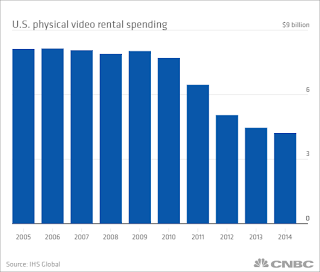Outerwall is convinced the move will work. In an interview with CNBC Digital, CEO Scott Di Valerio said the company had run test price increases over a period of several months earlier this year to determine whether the move made sense. While volumes may decline as a result of the price hike, the net impact is expected to be higher revenues. He also pointed out that box office results have been weak in 2014, and a better slate in 2015 could give Redbox a boost as well. The big question is how many customers will forgo Redbox rental and instead choose video-on-demand services. According to IHS, the typical on-demand movie sold through a set-top box costs $6.46. A digital rental through an Internet service like iTunes is a bit cheaper at $4.19, IHS said. While those options appear to be far more expensive than a one-day rental from Redbox, consumers tend to keep movies for a couple of days. At $1.50 or $2 per day, the price of a Redbox rental will generally be cheaper so long as a DVD is returned within three days. Redbox probably made the right move this time. Given that many costs are fixed, much of the new revenue from the price hikes will flow through to higher earnings. Wedbush analyst Michael Pachter estimates the price increase will lead to a 21 percent increase in Outerwall's operating income. That helps explain the 10 percent rise in Outerwall shares since Monday.
This may be the last thing saving DVDs from Apple
Sebastian Garcia Betancur
11/25/2014 05:32:00 p.m.
Outerwall is convinced the move will work. In an interview with CNBC Digital, CEO Scott Di Valerio said the company had run test price increases over a period of several months earlier this year to determine whether the move made sense. While volumes may decline as a result of the price hike, the net impact is expected to be higher revenues. He also pointed out that box office results have been weak in 2014, and a better slate in 2015 could give Redbox a boost as well. The big question is how many customers will forgo Redbox rental and instead choose video-on-demand services. According to IHS, the typical on-demand movie sold through a set-top box costs $6.46. A digital rental through an Internet service like iTunes is a bit cheaper at $4.19, IHS said. While those options appear to be far more expensive than a one-day rental from Redbox, consumers tend to keep movies for a couple of days. At $1.50 or $2 per day, the price of a Redbox rental will generally be cheaper so long as a DVD is returned within three days. Redbox probably made the right move this time. Given that many costs are fixed, much of the new revenue from the price hikes will flow through to higher earnings. Wedbush analyst Michael Pachter estimates the price increase will lead to a 21 percent increase in Outerwall's operating income. That helps explain the 10 percent rise in Outerwall shares since Monday.
Tags:
Tal vez te interesen estas entradas
Formulario de contacto
Popular Posts
Shop: Ariana Grande Launches Her Summer 2016 Collection with Lipsy London
4/27/2016 05:54:00 p.m.

Al menos 18 muertos y 49 heridos en atentado suicida en Afganistán
6/17/2018 03:02:00 p.m.
Foto. La felicidad de Rigoberto Urán al lograr el subcampeonato del Tour de Francia
7/24/2017 10:55:00 a.m.
Subscribe Us
Technology
3/Technology/post-list
Random Posts
3/random/post-list
Recent in Sports
3/Sports/post-list
Popular Posts
Shop: Ariana Grande Launches Her Summer 2016 Collection with Lipsy London
4/27/2016 05:54:00 p.m.

Al menos 18 muertos y 49 heridos en atentado suicida en Afganistán
6/17/2018 03:02:00 p.m.
Foto. La felicidad de Rigoberto Urán al lograr el subcampeonato del Tour de Francia
7/24/2017 10:55:00 a.m.
Aviso Legal
Created By SoraTemplates | Distributed By Gooyaabi Templates





0 Comentarios